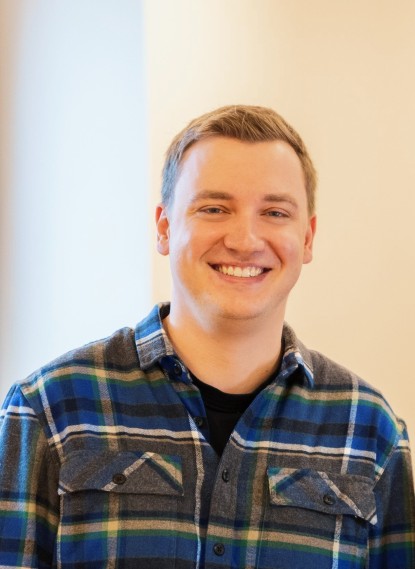
Dr. Florian Kadner
Psychology of Information Processing
Contact
Florian Kadner joined the lab as a PhD student in May 2019.
Until September 2022 he was working on the DFG project “Active vision: control of eye-movements and probabilistic planning”.
In January 2024 he defended his PhD thesis 'Active vision as sequential decision-making under uncertainty'.
Florian left the lab in April 2024.
Research interests
I am interested in how humans carry out eye-movements across different tasks and how this can be understood with models of probabilistic planning. To investigate these issues, I try to examine environments and stimuli that are as natural as possible. Other areas of interest are image saliency, adaptive human-computer-interaction models and applied methods of machine learning and cognitive modeling.
Publications
| Kadner, F. (2024). Active vision as sequential decision-making under uncertainty (PhD thesis). | [thesis] |
| Kadner, F., Willkomm, H., Ibs, I., & Rothkopf, C. (2023). Finding your Way Out: Planning Strategies in Human Maze-Solving Behavior. In Proceedings of the Annual Meeting of the Cognitive Science Society (Vol. 45, No. 45). |
[article] [preprint] |
| Kadner, F., Thomas, T., Hoppe, D., & Rothkopf, C. A. (2023). Improving saliency models' predictions of the next fixation with humans' intrinsic cost of gaze shifts. In Proceedings of the IEEE/CVF Winter Conference on Applications of Computer Vision (pp. 2104-2114). |
[article] [preprint] |
| Kadner, F., Keller, Y., & Rothkopf, C. (2021, May). Adaptifont: Increasing individuals’ reading speed with a generative font model and bayesian optimization. In Proceedings of the 2021 CHI Conference on Human Factors in Computing Systems (pp. 1-11). |
[article] [preprint] |
Talks & Presentations
| Improving saliency models' predictions of the next fixation with humans' intrinsic cost of gaze shifts | Talk at the Winter Conference on Applications of Computer Vision, January 3-7, 2023, Waikoloa, Hawaii, USA | |
|
Trade-off between uncertainty reduction and reward collection reveals intrinsic cost of gaze switches |
Talk at the annual meeting of the Vision Science Society, May 12-18, 2022, St. Pete Beach, Florida, USA | [abstract] |
| AdaptiFont: Learning font spaces and adaptive fonts to increase individuals reading speed | Invited talk in the seminar “Screen Memories” at the HAW Hamburg | |
| AdaptiFont: Increasing Individuals' Reading Speed with a Generative Font Model and Bayesian Optimization | Talk at the CHI Conference on Human Factors in Computing Systems, 2021 | [talk] |
Awards
| Winner of the TU Darmstadt Ideas Competition in the category “Scientists” for the project “AdaptiFont” (together with Constantin Rothkopf). | October 2022 |
Teaching
| Summer 2023 | Statistical modeling for cognitive science | Exercise | B.Sc. |
| Summer 2022 | Psychology Lab for Cognitive Science | Practical course | B.Sc. |
| Winter 2021 | Cognitive Science II: Cognition | Seminar | B.Sc. |
| Summer 2021 | Statistical modeling for cognitive science | Exercise | B.Sc. |
| Winter 2020 | Advanced Module III: Applied Cognitive Science | Seminar | M.Sc. |
| Summer 2020 | Statistical modeling for cognitive science | Exercise | B.Sc. |
| Specialization in cognitive psychology | Seminar | B.Sc. | |
| Winter 2019 | Advanced Module III: Applied Cognitive Science | Seminar | M.Sc. |
| Summer 2019 | Cognitive Modeling | Exercise | B.Sc. |
Co-supervised theses
| M.Sc. | |
| Christian Robert Bald | A Partially Observable Markov Decision Process model of blinking |
| Marius Kleboth | Comparing humans and reinforcement learning agents |
| Tobias Thomas | The neuroeconomics of eye movements |
| Tabea Alina Wilke | Learning temporal planning of gaze sequences under uncertainty |
| B.Sc. |
|
| Sebastian Bock | Human and Transformer Attention in Visual Question Answering |
| Tobias Niehues | Do humans adapt their planning horizon? |
| Thabo Matthies | Learning generative models for font synthesis |
| Dinh Khanh Thi Vo | Image captioning networks for saliency prediction |
| Trung-Hoa Ha | Comparing machine learning methods for font generation |
| Wassim Ben Salem | Fully Convolutional Network for Image Saliency |
